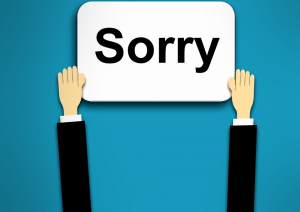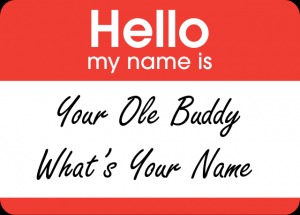Margaret was tired, stressed, and hoping for the best from her equally tired, stressed, and also trying hard husband of four years. But she felt extra burdened, like the final weight of everything was ultimately fell on her shoulders. They were both nearing the end of their ropes when a sudden project deadline loomed and the stakes to complete were high.
Nick worked on the project to the best of his ability, but it was his first time attempting the job and he didn’t have the necessary skill set yet. But with no time to gain the needed experience or to bring in an expert, his attempt would have to suffice. The real crux of the matter was that Margaret personal standards were quite a bit higher than Nick’s standards, which they both agreed on.
“I think it looks pretty good,” Nick commented rather proudly when the project was done. “Really? I don’t know how you can possibly think that, when I’m close to tears,” Margaret stoically replied. She was holding back a more pointed and mean response.
This young couple are not infrequently poles apart on the same thing. Communication should be easy enough, but it isn’t, even with those we are closest to and who we strive to understand the best. Maybe that’s because we don’t really work at communicating well and we just assume that the other person will eventually over time figure out that this is the way we are, take me or leave me, just as I am. Or, maybe it’s that we don’t know how to make changes in how we communicate. How important can it be any way, in the big scheme of things? Very important, if you rate happiness as being important. Relationship happiness is a key component to overall happiness.
As social beings we are all biologically geared towards cooperating and caring about others. We need other people and they need us. Survival dictates that we communicate well with others to get our needs met. In the old days these were physical needs like food (will you share your garden produce?), shelter (will you help me build a hovel?) and security (I’m on your team against our common enemy). Today those needs with others are now mental, centering on affection (will you love me?), friendship (will you be my friend?) and emotion (will you give me comfort when I’m sad?).
As competitive beings we are geared towards being selfish and putting our needs first ahead of others (survival of the fittest). Yes, we want the love of others, certainly the love of a spouse, but we must maintain our precious self-esteem. When self-esteem takes a hit, when self-confidence plummets, the selfishness inside of us looks to place the blame elsewhere. Me – wrong? Yeah, no, I don’t think so. We want to be right 100% of the time, which is problematic when everybody else feels exactly the same way. In reality most of the time we are probably more wrong than right, because we learn and grow from our mistakes.
The cleanest, most accurate definition of Communication is: moving what’s in your mind into another person’s mind. That’s all there is to it – creating that same picture from one mind to the next, with all the degrees of understanding/lack of understanding that exists between two minds, or among many minds, if communicating with a crowd. Easy to communicate well and clearly? Actually rather hard, because of all the variables that causes different minds to be any amount of legions apart.
You say one thing and you think it’s clearly understood. You forget how your understanding of something is so deeply colored by your experience level. And the other person has a completely different lifetime experience perspective, so by definition no one can understand something exactly the same way as you understand it. It’s just not possible, and so we have any myriad of communication problems, with no simple one-stop solutions.
The crux of a person’s personality is a product of how they were raised as a child and their unique reaction to those formative years. Two children from the same home can come out as very different adults, neither good nor bad, just different. This we all know and accept. What’s interesting is how this process occurs, especially interesting if you are a current parent raising young children.
We tend to raise our children similarly to how we were raised, with our parents doing the same thing back through the generations. So any communication problems, poor habits in addressing issues, lack of strong communication skills are passed down through the ages. Coupled with this is that our strong communication skills are not usually developed until we are older and we are well past our child-rearing years, so our young do not always gain the benefit of our newfound communication skills during their formative years. Unfortunately.
This is obvious in generation after generation where weak traits run through families, and the loop is rarely broken. One person communicates poorly because their parents were poor communicators, and their children continue along the same lines subsequently poorly communicating with their own children, because it’s all they know. It’s hard to change what you’ve known and practiced since childhood; it’s really hard to adopt new behavior when you don’t know it exists. And knowing and accepting are two different things. There’s really no one to blame for poor communication skills, but everyone in society loses.
Back to Margaret and Nick. Nick’s values tells him that giving a passable effort is good enough and ‘good on you’ for trying, which is what he heard his whole life growing up. The easy way is acceptable and better than not doing anything at all. Margaret’s work ethic is along the lines of ‘take pride in your work; anything worth doing is worth doing well’ and she can’t settle for any half-assed attempt, certainly not with her name attached.
But if she continues to beat Nick up over the years about his inferior work output, he will cease to listen, become unmotivated, and will stop trying altogether. “If it’s not good enough for you, do it yourself” is the common voice of one who is protecting their self-esteem. But this response is not a conversation starter, rather it’s a nonstarter. And not talking through the years turns into ‘we’ve grown apart’, often culminating in divorce.
Communicating well and consistently is hard but not impossible. Every relationship is like a garden; it needs tending, weeding, and a good amount of attention to thrive and stay healthy.










